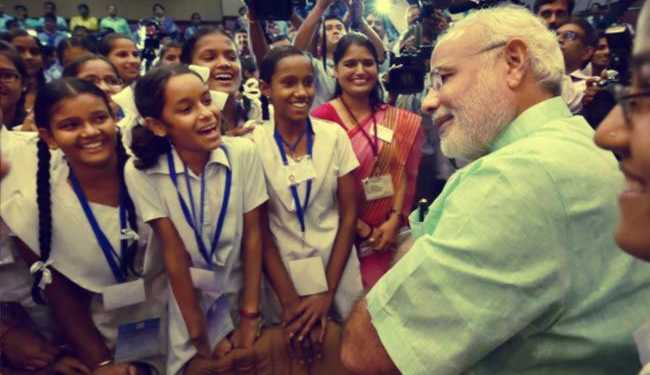If 2017 was the year of GST, 2018 will be the year of reforms in Education sector if the early signs are anything to go by. HRD Minister Prakash Javadekar announced that from 2019, NCERT syllabus will be halved which will provide much-needed respite to the students.
The thinking behind the decision is to allow the students to have time to explore extra-curricular activities to ensure their all-round development which is not possible in the current scenario since the present course is more than that of BA and B. Com courses. Many schools across the country do not detain the students till Standard VIII. That will also change soon since the government is planning to bring up a bill in the parliament during the next part of the Budget session which will make detention mandatory for students who have failed in the re-exams too.
The decision to halve the NCERT syllabus and reduce the burden on students is expected to be one of the many education related initiatives that will be taken by the government this year. The focus has shifted from providing access to education to providing quality education as the government believes access to school education is more or less achieved. The government has shifted its focus to skill development of teachers to ensure quality education. As per the Right to Education Act, 20 Lakh teachers were to be trained for skill upgradations programme by 2015 however only five lakh teachers were covered. Currently, over 14 Lakhs are undergoing skill development programme with the government increasingly vary of deteriorating quality of education.
While some of the decisions (including this one) taken by the government to improve the education sector might have been swept under the carpet by the media, the decisions nonetheless remain extremely important. The reforms started with making NEET mandatory for all students wishing to get into medical colleges. This move head dealt a blow to the rampant corruption and the auction of medical seats that existed in the system. Understandably, the move was met with widespread protests, especially in Tamil Nadu. In August 2016, SRM University Chancellor TR Pachamuthu was arrested by the Chennai Crime Branch police for cheating over 100 students who had paid capitation fees for medical seats but were denied admission. The same institution was raided in 2013 by the CBI for the alleged payment of capitation fees for MBBS admissions which unearthed unaccounted money in terms of crores.
The government is also planning to make JEE a one-stop exam for securing admission in engineering colleges across the country, which will see exams conducted by various private universities done away with it.
Introduction of Aadhar in the education system has proved to be a game changer for the government especially in bridging the urban-rural divide. Teachers’ profiles are being linked to Aadhar and to deal with their distorted ratio in rural and urban India, teachers will be regularly transferred to rural schools. It was found that teachers are also made to do non-teaching work especially in rural areas and taking this issue into an account, the government made mandatory for the schools to put photographs of teachers to avoid proxy teachers doing the job of permanent ones.
The government is also coming up with New Education Policy, which will change the face of India’s education system is expected to be finalised by the end of the month. The government has opened a portal for hearing the suggestions of its citizens with the aim of incorporating them in the New Education Policy.
Don’t forget the massive one nation one board scheme, which once implemented, will unify the country as a single entity much like GST did. At present there are more than 50 recognised educational boards in India of various types- all India boards like CBSE and ICSE, state level boards, international boards like IB and IGCSE and open schooling boards like NIOS. Each has its own schedules, pedagogy and curriculum. This causes problems at various levels.
India’s education system is in dire straits with corruption being the biggest hindrance in the country’s path towards achieving quality education for all. One hopes that the New Education Policy will bring in much-needed reforms in the education sector which is the need of the hour.
Despite so much happening in the educational sector, why does the media underreport it? If one state board introduces a chapter on Savarkar, TV Studio Rooms go into an overdrive but when such pathbreaking reforms are taking place, the media maintains a sullen silence. It will be interesting to note their reaction when finally the much awaited “change” in the curriculum happens, especially the “History” part of it. What will they call it? “Saffronization of Education” is my best guess.




























